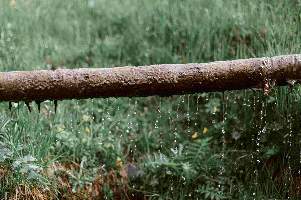Septic tanks. The pros and the cons… get the low-down.

You’ve bought your dream house in the country. It’s got views, it’s got roses round the door, it’s got a septic tank! What do you need to know?
Firstly, do you really have a septic tank because there are different types of private sewage systems. They are all used in areas where there is no access to a public sewer system. It might be a septic tank or a cesspit, or you may even have a sewage treatment plant. Always look for accuracy when describing what kind of private drainage system the property enjoys.
The good news is that your water bill from Yorkshire Water will reduce by about a half, as the sewage part of the bill disappears. But the task of managing your own sewage is all yours, and there will be costs involved, in maintenance and possible replacement.
When buying your new dream property, here are a few things to consider:
Compliance and regulation
Check if the septic tank complies with the relevant regulations and permits. Regulations changed in 2020. Understand the potential environmental impact of a septic tank system if it’s not functioning properly. Contamination of soil and water sources can have serious consequences, and there can be big fines involved if your septic tank is not functioning properly.
Condition of the system
Get a professional inspection of the septic tank system before purchasing the property. This inspection should include the tank’s structural integrity, drainage field and overall functionality. This will give you an idea of the system’s condition and potential repair or replacement costs.
Location
The location of the septic tank and its drainage field is critical. It should comply with legal setback requirements and not pose a risk to water sources, nearby buildings or public areas. Check for any signs of waterlogging, unpleasant smells, or sewage backups in the vicinity of the system. And check how much sound it makes and whether it requires an electricity supply.
Is it on your land? Does it cross anyone else’s land? If you have land, do you hold anyone else’s septic tank, and what is the condition of that? Is your septic tank shared? All key questions, to avoid difficulties in the future.
Access
Ensure that there is proper access to the septic tank for service vehicles, and be mindful that these vehicles can be very large tankers.
Maintenance and upkeep
Regular pumping and maintenance are necessary to prevent blockages, backups, and environmental issues. Determine the frequency at which the tank needs to be emptied and consider the cost.
When you buy a property in a rural area, there are upsides and downsides: no gas towers means no gas; no sewage works means no sewage system, no noisy motorways means slower journey times. In the UK, about 500,000 households use septic tanks. They can largely be ignored on a day-to-day basis as a fully-functioning septic tank will do its job effectively. But you do need to know what state they’re in before you buy and remember to service them regularly.
For more information, please contact Declan Hayes on 01756 692888 or email declan.hayes@awbclaw.co.uk.

More from our property team:
What’s the difference between leasehold and freehold?
Going, Going, Gone… Our advice on buying property at auction
Leaseholds need management companies. Why?
External links:
18 September 2023
